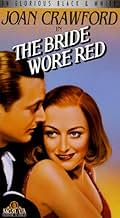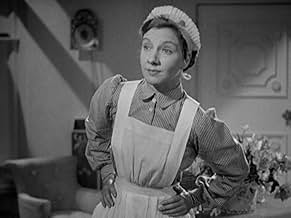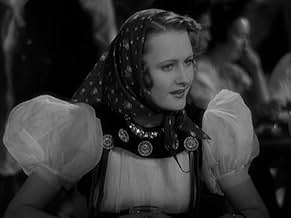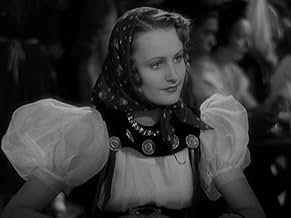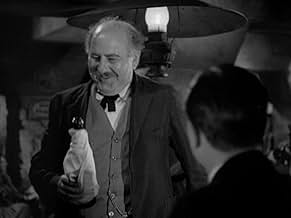IMDb रेटिंग
6.3/10
1.3 हज़ार
आपकी रेटिंग
अपनी भाषा में प्लॉट जोड़ेंA lounge singer is sent by a count to pose as a wealthy socialite.A lounge singer is sent by a count to pose as a wealthy socialite.A lounge singer is sent by a count to pose as a wealthy socialite.
Mary Philips
- Maria
- (as Mary Phillips)
Rafael Alcayde
- Hotel Clerk
- (बिना क्रेडिट के)
Nino Bellini
- Cosmos Club Waiter
- (बिना क्रेडिट के)
Agostino Borgato
- Cordellera Bar Waiter
- (बिना क्रेडिट के)
Adriana Caselotti
- First Peasant Girl
- (बिना क्रेडिट के)
Robert Cauterio
- Hotel Clerk
- (बिना क्रेडिट के)
Irene Coleman
- Cosmos Club Hat Check Girl
- (बिना क्रेडिट के)
Gino Corrado
- Cosmos Club Croupier
- (बिना क्रेडिट के)
फ़ीचर्ड समीक्षाएं
The Bride Wore Red is a ridiculous but fun film. A drunken count, slumming it for the night, runs into a cynical and hungry young woman, Anni Pavlovitch (Joan Crawford). He decides to send her on a luxury vacation to prove his drunken point that the poor and the rich aren't so different after all and buys her new clothes and arranges for her to stay in a luxury resort. Anni, who obviously thinks the whole thing is crazy, decides to go threw with it anyway. Arriving in the alps she meets Giulio (Crawford's real life husband, Franchot Tone) a very pert mail employee who immediately takes a shine to her. The two have sparks aplenty, but when she arrives at the hotel Anni quickly realizes that she would rather always have food on her table than the love of a good man, and quickly sets about seducing Rudi, a flighty engaged man who is very taken with her.
As with most romcoms the real test is if the chemistry works and here it does perfectly. Crawford and Tone have excellent chemistry here and he is very sweet and naive, persistently wearing down the jaded and bitter singer.
It's a lovely sweet film.
As with most romcoms the real test is if the chemistry works and here it does perfectly. Crawford and Tone have excellent chemistry here and he is very sweet and naive, persistently wearing down the jaded and bitter singer.
It's a lovely sweet film.
In about 1980 I saw this film at the UCLA Film Archives in a series presenting Dorothy Arzner directed films. There was a guest speaker at the event who was a personal friend of Arzner's. I don't remember her name, but she was introduced as, among other things, the writer for the script of "Craig's Wife" (1936; starring Rosalind Russell).
She said she was on the set for some of the shooting of "Bride Wore Red," and described how Joan Crawford was completely uncooperative with the director. Originally it was written for Luise Rainer but for some reason she was unavailable. "So they got Joan Crawford who wasn't anything like her," and was not suited for the film in this woman's opinion. While she was on the set she witnessed how Dorothy Arzner would gently make suggestions as to how to play a scene, "...and Joan would scream, 'You'll destroy me! You'll destroy me!' and she would run up to L.B. Mayer and he would say, 'There, there Joan, play it your way." So she did, "...and frankly, the film bombed. But when you have a star that is entirely uncooperative, you can't blame the director." I hope I have quoted this woman accurately. That is what has stuck in my memory. I am a big Crawford fan, but her flaws were apparently spectacular. I just thought it would be interesting to record this bit of info.
She said she was on the set for some of the shooting of "Bride Wore Red," and described how Joan Crawford was completely uncooperative with the director. Originally it was written for Luise Rainer but for some reason she was unavailable. "So they got Joan Crawford who wasn't anything like her," and was not suited for the film in this woman's opinion. While she was on the set she witnessed how Dorothy Arzner would gently make suggestions as to how to play a scene, "...and Joan would scream, 'You'll destroy me! You'll destroy me!' and she would run up to L.B. Mayer and he would say, 'There, there Joan, play it your way." So she did, "...and frankly, the film bombed. But when you have a star that is entirely uncooperative, you can't blame the director." I hope I have quoted this woman accurately. That is what has stuck in my memory. I am a big Crawford fan, but her flaws were apparently spectacular. I just thought it would be interesting to record this bit of info.
Joan Crawford stars in "The Bride Wore Red," a 1937 MGM film based on the play by Ferenc Molnar. Here, it's directed by Dorothy Arzner. Arzner was a fascinating woman - a female director amid a sea of men - very much ahead of her time in her dress, profession, and lifestyle, and highly intelligent. Was she a great director? Hard for me to say. I don't think she always got the best scripts. And in Crawford, she had a headstrong star as well.
The story concerns a poor girl, Anni (Crawford) who sings in a sleazy café (read: with prostitution as a sideline)in the red light district of Trieste. A count she meets believes that the only thing separating the rich from the poor is money - it's not class, it's not breeding, it's not education. To make his point, he sends Anni to a fabulous resort with beautiful new clothes for two weeks. Anni meets Rudi (Robert Young), from an excellent and wealthy family, but he's engaged. With time short, Anni decides that it's Rudi she wants, and is determined to stick it out as long as necessary to get him. But it's not only a lack of funds and Rudi's fiancé standing in her way - it's also the postman, Giulio (Franchot Tone).
Crawford is beautiful, and this was the type of role she played continuously in the 1930s with great success. Tone, Young, and Billie Burke give her good support.
What is this business with the "no European accents" that someone mentioned? Actors do not use European accents when portraying foreigners in their own country or a nearby country. The characters aren't speaking English with a foreign accent in Poland, Switzerland, or Italy. They're speaking another language. If accents were necessary, all Chekov plays would be done with Russian accents. They aren't.
I thought for what this was, the film took a little too long to make its point and was a bit slow in spots. It's not the best Crawford film, but she gives a strong performance as a willful woman determined to marry money. As for Arzner's direction, apparently she couldn't get anywhere with Crawford, so I'll withhold judgment.
The story concerns a poor girl, Anni (Crawford) who sings in a sleazy café (read: with prostitution as a sideline)in the red light district of Trieste. A count she meets believes that the only thing separating the rich from the poor is money - it's not class, it's not breeding, it's not education. To make his point, he sends Anni to a fabulous resort with beautiful new clothes for two weeks. Anni meets Rudi (Robert Young), from an excellent and wealthy family, but he's engaged. With time short, Anni decides that it's Rudi she wants, and is determined to stick it out as long as necessary to get him. But it's not only a lack of funds and Rudi's fiancé standing in her way - it's also the postman, Giulio (Franchot Tone).
Crawford is beautiful, and this was the type of role she played continuously in the 1930s with great success. Tone, Young, and Billie Burke give her good support.
What is this business with the "no European accents" that someone mentioned? Actors do not use European accents when portraying foreigners in their own country or a nearby country. The characters aren't speaking English with a foreign accent in Poland, Switzerland, or Italy. They're speaking another language. If accents were necessary, all Chekov plays would be done with Russian accents. They aren't.
I thought for what this was, the film took a little too long to make its point and was a bit slow in spots. It's not the best Crawford film, but she gives a strong performance as a willful woman determined to marry money. As for Arzner's direction, apparently she couldn't get anywhere with Crawford, so I'll withhold judgment.
I had high hopes for this one. The plot sounded good. Eccentric Count Armalia (George Zucco) believes that luck of birth is all that separates the rich from the poor. To prove his point, he sets up dive singer Anni (Joan Crawford) as a fake socialite to fool his rich friends. This works but snobbish Robert Young falls for her and wants to marry her. Anni sees the chance to get out of poverty by marrying a rich guy but, at the same time, she has started to fall for poor Franchot Tone. So it becomes a question of whether Anni will choose love or money. Glossy MGM soaper with a nice cast but somehow just misses the mark. It was nice seeing George Zucco in a different kind of role. Also Billie Burke is sort of evil, which is interesting. See it for the cast or out of curiosity. You might enjoy it more than me.
Jaded club singer Anni Pavlovitch (Joan Crawford) runs into a count who devises a plan to give Anni an opportunity to swing with the swells for two weeks in a rustic Italian vacation spot in the mountains. Anni is totally seduced by the lifestyle and with time running out moves in on Maddelena Monti' s well heeled beau Rudi Pal ( Robert Young) to try an insinuate herself into the jet set lifestyle on a more permanent basis. The local postman Giullio (Franchot Tone) has also taken a shine to Anni offering her an unencumbered down to earth existence in contrast but cynical Anni is tired of the hardscrabble existence preferring pampered materialism instead.
Under the rare oddity of a female studio film director (Dorothy Arzner) Crawford is allowed to stretch with more than satisfying results as she struggles with the conflict of hooking up for love or money. Arzner not only gets some impressive long takes out of Crawford but also softens her standard studio brusqueness with a touching sensitivity as her dream of easy street evaporates before her eyes.
Arzner also gets fine performances out of upper crusts played by Young and a beautifully smug performance from Billie Burke without being condescending to such easy targets. The real surprise though is the sophisticated Franchot Tone as Giullio the country postman. Playing it neither broad or passionate Tone subversively bides his time with a dignity and patience that gives The Bride Wore Red a nice subtle edge and a more touching denouement.
Under the rare oddity of a female studio film director (Dorothy Arzner) Crawford is allowed to stretch with more than satisfying results as she struggles with the conflict of hooking up for love or money. Arzner not only gets some impressive long takes out of Crawford but also softens her standard studio brusqueness with a touching sensitivity as her dream of easy street evaporates before her eyes.
Arzner also gets fine performances out of upper crusts played by Young and a beautifully smug performance from Billie Burke without being condescending to such easy targets. The real surprise though is the sophisticated Franchot Tone as Giullio the country postman. Playing it neither broad or passionate Tone subversively bides his time with a dignity and patience that gives The Bride Wore Red a nice subtle edge and a more touching denouement.
क्या आपको पता है
- ट्रिवियाDuring filming, an electrician fell from the catwalk high above the set, narrowly missing the film's star, Joan Crawford. Shooting was temporarily halted while the man was rushed to hospital. Crawford refused to resume production until she was assured that the man would be fully cared for, that he would remain on salary, and that his family would be provided for. Crawford also called the hospital each day afterwards for reports on his condition.
- भाव
Rudolph 'Rudi' Pal: In my opinion, most people prefer sardines to caviar because most people haven't tried caviar.
- क्रेज़ी क्रेडिटDuring the opening credits, a music box is shown playing a tune in the background.
- कनेक्शनFeatured in The Romance of Celluloid (1937)
- साउंडट्रैकWho Wants Love?
(1937)
Music by Franz Waxman
Lyrics by Gus Kahn
Sung by Joan Crawford (uncredited) at the Cordellera Bar
Played throughout as part of the score
टॉप पसंद
रेटिंग देने के लिए साइन-इन करें और वैयक्तिकृत सुझावों के लिए वॉचलिस्ट करें
- How long is The Bride Wore Red?Alexa द्वारा संचालित
विवरण
- रिलीज़ की तारीख़
- कंट्री ऑफ़ ओरिजिन
- भाषा
- इस रूप में भी जाना जाता है
- Once There Was a Lady
- फ़िल्माने की जगहें
- ऑस्ट्रिया(Alpine exteriors)
- उत्पादन कंपनी
- IMDbPro पर और कंपनी क्रेडिट देखें
बॉक्स ऑफ़िस
- बजट
- $9,60,000(अनुमानित)
- चलने की अवधि1 घंटा 43 मिनट
- रंग
- पक्ष अनुपात
- 1.37 : 1
इस पेज में योगदान दें
किसी बदलाव का सुझाव दें या अनुपलब्ध कॉन्टेंट जोड़ें



